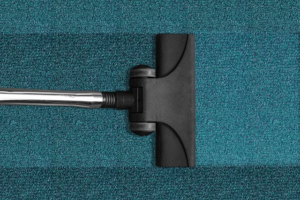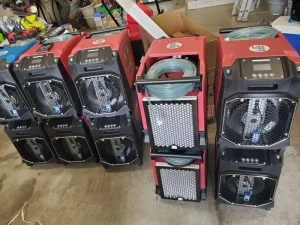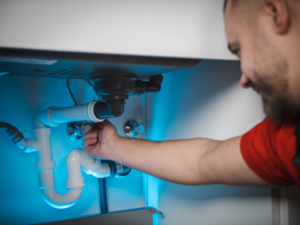Reduce Your Water Damage Risk With These Maintenance Tips for Nashville Homeowners.
Spring is a great time of year to perform maintenance tasks around your home to reduce the risk of water damage. Damage caused by water is a difficult issue to deal with, and you may want to consider contacting Flood Kings to help with your cleanup and repairs.
Not only will we provide an accurate estimate and documentation required for your insurance claim, but we will conduct a professional and thorough restoration of your property.
In Nashville, TN, spring brings rain, storms, and increased humidity, which can all contribute to water damage if your home is not properly maintained.
Did you know, in Nashville, TN, the average rainfall during the spring months of March, April, and May is about 9-13 inches? However, the amount of rainfall can vary from year to year and from month to month. It’s important to be prepared for potential rain and storms during the spring season, as excessive rainfall can lead to water damage to your home if it is not properly maintained.
Here are some spring maintenance tips to help reduce the risk of water damage in your Nashville home.
- Inspect Your Roof
Your roof is the first line of defense against water damage, so it’s important to inspect it regularly, especially after the winter season. Check for missing or damaged shingles, and make sure that the flashing around chimneys, vents, and skylights is properly sealed. If you notice any water damage, contact a professional roofer to make repairs before the spring rains arrive.
- Clean Your Gutters
Gutters play an important role in directing rainwater away from your home’s foundation. If your gutters are clogged with leaves and debris, they can’t function properly, and water can overflow and pool around your foundation, leading to water damage. Clean gutters and downspouts regularly to ensure that water is being properly directed away from your home. Install gutter guards to help prevent water damage from your gutters. If water damage does occur, you’ll need an accurate estimate from Flood Kings to determine the cost of repairs.
Testing your gutters is simple, just dump some water into them and ensure there is water flowing to the ends where the drainage occurs. Also, keep an eye out for dams of ice in the winter, which can form on the roof or in blocked gutters and cause significant water leakage in the entire house.
- Check Your Basement and Crawlspace
Basements and crawlspaces are prone to water damage, especially if they are not properly sealed. Check your basement walls and crawlspace for signs of water damage, such as water stains, bubbled paint, mold development, or musty odors. If you notice any signs of damage, address the issue as soon as possible to prevent further damage.
According to data from the U.S. Census Bureau, approximately 55% of homes in Nashville, TN have a basement. However, this percentage may vary depending on the specific neighborhood or area of the city. It’s important to keep in mind that homes with basements may have unique maintenance requirements to prevent water damage, such as ensuring proper sump pump function and checking for cracks in the foundation walls.
- Monitor Water Pressure and Water Flow
The home’s water pressure and flow can be indicators of whether or not a home has a healthy water system. Decreasing water pressure could be a sign of burst pipes or silent but steady leaks. Since water leaks may not be dramatic enough to notice right away, it might be wise to start testing your water pressure regularly with a water pressure gauge. If you notice an anomaly, it may be time to play with the pressure release valve on your water heater or contact professionals to inspect the home.
Additionally, investing in a water flow monitoring system could save you a ton of money by setting off water alarms when something is wrong. Another easy way to monitor the flow is to keep an eye on your water bill. A sudden spike in the cost of the water bill may indicate more water is flowing through your home than is necessary. You can find a water pressure regulator, gauge, and other tools to analyze your water supply at a local hardware store.
- Seal Windows and Doors
Windows and doors are common areas where water can seep into your home, especially during heavy rain or storms. Caulk is a substance used to seal the edges of doors and windows throughout the home. Over time, this caulking can lose its integrity or peel away from the surfaces it is adhered to. Check the caulking and weatherstripping around your windows and doors, and make sure that they are properly sealed. You could add metal flashing to the exterior if needed. Flood Kings can advise you on needed repairs to keep your property dry.
If you notice missing or cracked caulking around your home, be sure to apply new caulk to the area. This is one common source of hidden water damage in your walls, which can lead to extensive damage. Leaving the sealant around your windows or doors in poor condition can create leaks, especially during heavy storm seasons. If repairs are needed, Flood Kings can document the damage and restorations for your insurance claim.
- Maintain Your HVAC System
Your HVAC system plays an important role in controlling the humidity levels in your home.
Spring is a good time to perform maintenance on your HVAC system to ensure it is running efficiently and effectively throughout the summer months. Here are some maintenance tasks you can perform on your HVAC system in the spring:
- Replace the air filter: Replace your HVAC system’s air filter to improve air quality and ensure proper airflow. A dirty air filter can restrict air flow, making your HVAC system work harder and less efficiently.
- Clean the air vents: Dirt and debris can accumulate in the air vents over time, reducing airflow and air quality. Use a vacuum or brush to clean the air vents and remove any buildup.
- Check the thermostat: Check that your thermostat is functioning properly and set to the appropriate temperature. Replace the batteries if necessary.
- Inspect the outdoor unit: The outdoor unit of your HVAC system can become clogged with debris or foliage over the winter months. Check the unit and remove any debris to ensure proper airflow.
- Schedule a professional inspection: Consider scheduling a professional inspection of your HVAC system to identify any potential issues and ensure it is functioning properly.
- Maintain Water Appliances
One of the biggest culprits of severe damage to your property from water is appliances. Performing regular maintenance on these appliances, or even upgrading to newer, more efficient models, can protect your home from structural damage by mitigating the normal wear and tear that often leads to leaks. This maintenance will also help you monitor your water supply.
Maintain Washing Machines, Dishwashers, Ice Makers, Water Heaters, ETC.
Appliances that use a lot of water can quickly cause disaster if a leak or breakage occurs, so perform any necessary fixes or cleaning promptly.
- Test Your Sump Pump
If you have a basement or crawlspace, it’s important to have a working pump to prevent water from flooding your home. Test your pump by pouring water into the sump pit to make sure that it is functioning properly. If you notice any issues, contact a professional to make repairs or replacements. Clogged discharge lines can wreak havoc on your main pump, rendering it ineffective, so check it regularly to ensure it works properly.
- Update Pipes
If you live in an older home, chances are most of your plumbing system is made up of solid copper pipes. If they are old, then corrosion could lead to plumbing leaks with these aging pipes. Updating the older parts of your home’s plumbing can prolong the life of the system and prevent pinhole leaks from forming. Plus, it can guard against freezing pipes that burst in the winter. Hire a professional plumber to upgrade to PEX pipes that are more durable and resistant to corrosion.
- Install a Dehumidifier
Nashville’s humid climate can contribute to moisture buildup in your home, which can lead to mold growth and moisture damage. If you spot mold, it is always best to contact a mold remediation specialist near you to inspect and remove the growth.
The size of the dehumidifier needed in a typical home in Nashville, TN will depend on several factors, including the size of the home, the level of humidity, and the specific area of the home where the dehumidifier will be used. However, a general guideline for selecting the appropriate size of a dehumidifier is to consider the square footage of the space where it will be used.
For a typical home in Nashville, TN, a dehumidifier with a capacity of 30-50 pints per day should be sufficient for a space of up to 2,000 square feet. For larger homes or areas with higher levels of humidity, a larger capacity dehumidifier may be necessary. It’s also important to consider the specific needs of the home, such as whether the dehumidifier will be used in a basement, crawlspace, or other areas of the home.
When selecting a dehumidifier, it’s important to choose a model with a built-in humidistat, which will allow you to monitor the humidity levels and adjust the dehumidifier accordingly. Additionally, choosing a model with an Energy Star rating can help you save on energy costs over time.
- Use Landscaping to Your Advantage
One tip that many homeowners don’t know about is how the exterior property can cause slow leaks or excess water in the home. If you can minimize landscaping issues, damage to your home can be prevented. Developing irrigation systems that direct water away from the foundation wall of your home can help eliminate leaks. Additionally, a soil grade that pushes water away from the house can help as well.
Regularly inspect the outside of the home for cracked bricks, a compromised sprinkler system, loose mortar, or water puddles that last for an extended period. Maintain trees on the property to ensure they cannot damage the exterior in high winds. Grow shrubs near the home so the roots can soak up water.
- Shut Off the Water When Away
Water seepage, even in small amounts, can do significant damage to your home over time. Often, when homeowners leave for vacation, they come home to a lot of water damage. To help mitigate this threat, if you will be away from home for a while, shut off the main water valve in your home. This way, you won’t return home to find water leaking.
- Inspect Sinks and Drains
The kitchen sink, bathroom sinks, and drains in your home can easily become clogged with debris. If water rises in these basins without draining, it could indicate that there is a clog, and standing water could cause damage to nearby areas like damp wood on sink cabinets.
Check your drains regularly to ensure that water is flowing through them cleanly.
Conclusion
Performing spring maintenance tasks around your Nashville home can help reduce risk of water damage and protect your home from costly repairs. By inspecting your roof, cleaning your gutters, checking your basement, monitoring water pressure, sealing your windows/doors, maintaining your HVAC system, testing your pump, and installing a dehumidifier, you can protect your home from water damage. Don’t wait until it’s too late – take these steps to protect your home from water damage today.
Contact Flood Kings When Your Home Needs Water Restoration
If you do find yourself with a water damage issue, contact us anytime day or night about our emergency water damage restoration services. Whether you have leaky water heaters, rotting sink cabinets, malfunctioning sump pumps, or corroded copper pipes, our team can handle the damage and return your home to its pre-incident condition.








